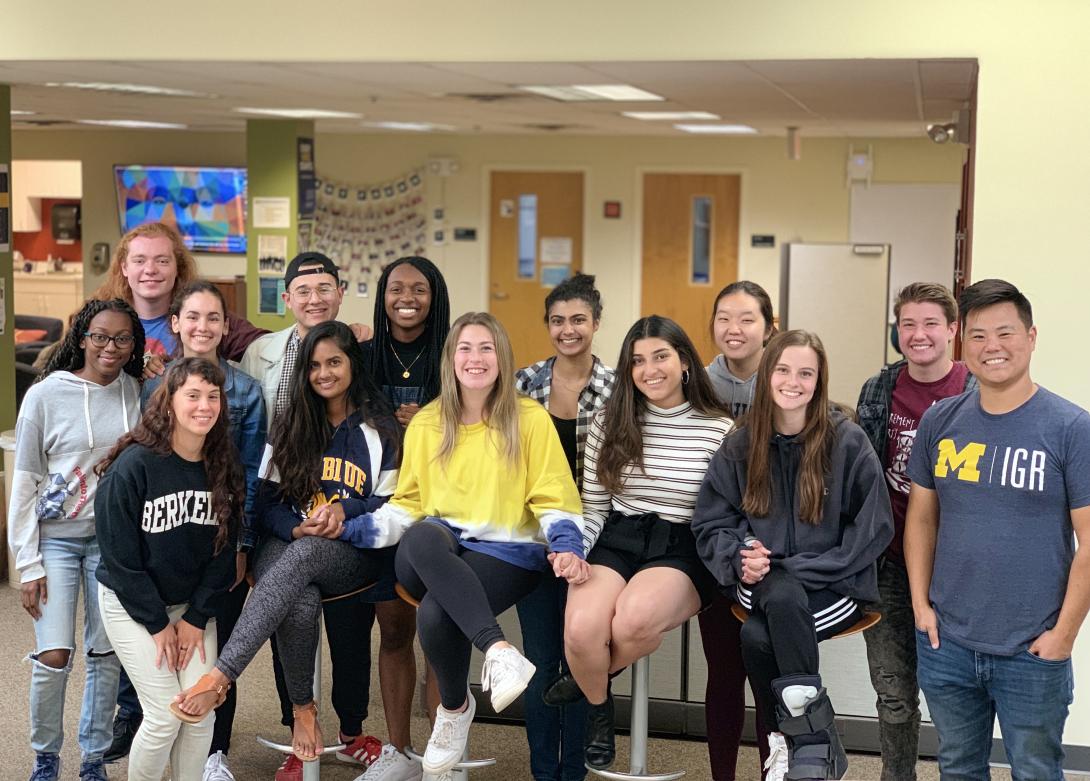September 24, 2019 | By Hannah Brauer (she/her/hers), Photographer/Writer Student Lead
Bhoomika Gupta (she/her/hers) and Noah Bonello (he/him/his) both became involved in The Program on Intergroup Relations (IGR) on a whim. Gupta, a junior studying psychology, took a dialogue course to fulfill distribution requirements while Bonello, a junior studying computer science, signed up for a foundations course because it fit into his schedule. The two were recommended to take IGR Training in winter 2019, and since then, they have been paired up to co-facilitate a dialogue for IGR Practicum.
IGR Practicum is the summit course in the IGR facilitator training sequence where students spend half their time in class with an instructor and half their time facilitating a dialogue course. Students also attend a retreat to break the ice and prepare to teach their classes.
This semester, Gupta and Bonello are co-facilitating a dialogue surrounding race and ethnicity and are excited to take on the opportunity to influence a new group of students.
“There’s a lot more responsibility being a co-facilitator…now we’re both responsible for 11-16 other students of shaping the way they think,” said Gupta. “The reason I declared IGR is because of my dialogue, so we have that power now to [make the same] impact.”
“I’m really excited to get closer to the people I’m facilitating and hear them open up,” said Bonello. “One of the activities we recently did was talking about the difference between discussion, debate, and dialogue, and I want to hear incredible dialogue...I know it’s going to happen, so I’m thrilled to witness that and think ‘wow, look at what we did.’”
The pair is also anticipating tension in their group, but expressed the importance of conflict for healthy conversation.
“I’m excited to see conflict arise,” said Gupta. “I’m scared about it, but it’s also a really good sign of people opening up with one another and willing to take the chance to expose their opinion or viewpoint.”
Both Gupta and Bonello plan to minor in IGR after being impacted by their courses. They reflected upon their personal growth through discovering and understanding their own identities.
“Personally, I’ve opened up about some of my own identities that I didn’t even know I held. Now I think about them on a daily basis,” said Bonello. “After taking IGR, I have so many thoughts going through my head of what different identities are doing in these conversations. Virtually anything you do, you can apply to IGR.”
They noted their personal and professional development in leadership, public speaking, and communication skills that will help them in their future careers and lives. The takeaways from IGR, they said, are lifelong.
“It’s long-term learning, not short-term learning,” said Gupta. “[With most other classes], a lot of it is rote learning, conceptual stuff that may not get used eventually. But with IGR...a lot of it has become more subconscious. I do think about these things: the words I’m using, pronouns addressing people, how my identities affect the way I maneuver around campus, how other people’s might affect them. That’s been the biggest rewarding aspect of IGR.”
Learn more about how to become an IGR co-facilitator at igr.umich.edu.
This article was featured in CAs, a community newsletter through IGR for students interested in social justice education. Subscribe to stay informed on all things IGR.

